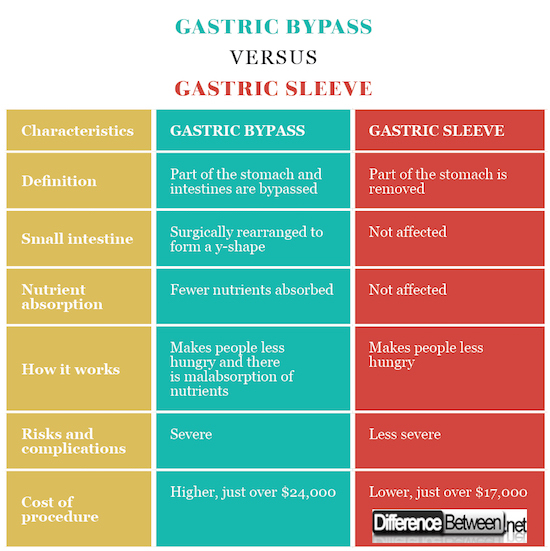Difference Between Gastric Bypass and Gastric Sleeve
What is Gastric Bypass?
Definition of Gastric Bypass:
Gastric bypass is a procedure where a piece of small intestine is used to connect the top part of the stomach to the jejunum of the small intestine, effectively bypassing the stomach and the first part (duodenum) of the small intestine and rerouting the intestines. This procedure is also known as the Roux-en-Y since the intestines form a y-shape after the procedure.
Uses of Gastric Bypass:
The procedure is used to assist with weight loss in patients who have a body mass index (BMI) of over 40 and who are considered to be morbidly obese; and for patients with a body mass index between 35 and 40 who also have a condition related to being overweight, such as high blood pressure or type 2 diabetes.
How Gastric Bypass works:
Food bypasses the posterior part of the stomach and the duodenum and enters directly into the jejunum. Gastric juices from the stomach enter the duodenum which is then rejoined to the jejunum. This means many nutrients from food are not absorbed. The stomach is also made very small so that only about 1 ounce of food can be contained, thus people have to eat less.
Risks and complications involved in Gastric Bypass:
There are risks associated with the surgery, including heavy bleeding, infection, leaking from the digestive system, and a small possibility of death. There can be later complications from gastric bypass including bowel obstruction, dumping syndrome, gallstones, stomach perforation or ulcers.
Advantages of Gastric Bypass:
There is more weight loss with the gastric bypass compared with gastric sleeve. Gastric bypass also leads to greater resolution of comorbidities than is the case with the gastric sleeve procedure. In other words, patients may no longer have such illnesses as type 2 diabetes or GERD after gastric bypass. These two conditions, in particular, are often better resolved with bypass than sleeve surgery.
Disadvantages of Gastric Bypass:
Since part of the small intestine, the duodenum is bypassed in this procedure, it means that fewer nutrients are absorbed and patients may suffer from lack of vitamins, which may necessitate taking supplements to overcome this problem. There are potentially more side effects and the procedure is more expensive than the gastric sleeve.
What is Gastric Sleeve?
Definition of Gastric Sleeve:
Gastric sleeve is a procedure in which most of the stomach (85%) is removed leaving a sleeve of the stomach in place, but intestines are left unaffected and not rerouted.
Uses of Gastric Sleeve:
The procedure is used to assist with weight loss in patients who are morbidly obese, that is patients who have a BMI value that is 40 or higher, or who have a BMI of 30 up to 39.9 as well as comorbid conditions such as sleep apnea, type 2 diabetes or hypertension.
How Gastric Sleeve works:
The stomach is stapled and made smaller in size so that less food can be contained in the stomach, meaning a person eats less. The food can still enter the duodenum as usual and nutrients can be absorbed.
Risks and complications involved in Gastric Sleeve:
There are risks associated with the surgery including bleeding, leaking from the digestive system, and possible problems with digestion.
Advantages of Gastric Sleeve:
Since the small intestine is unaffected by this procedure, it means that nutrients are still well absorbed since food still passes through the duodenum, and patients may not need to have to take supplements. There tend to be fewer side effects compared with the gastric bypass, and the procedure is less expensive than the gastric bypass. This surgery is slightly quicker than gastric bypass and patients may spend less time in the hospital recovering.
Disadvantages of Gastric Sleeve:
There may be less weight loss with the gastric sleeve compared with gastric bypass, or it may take longer for weight loss to occur. The gastric sleeve does not always lead to as a good a resolution of comorbidities as occurs with the gastric bypass procedure. For instance, GERD and diabetes type 2 only resolve in about 50% of patients.
Difference between Gastric Bypass and Gastric Sleeve
-
Definition
Gastric bypass is a procedure where part of the stomach and intestines are bypassed, while the gastric sleeve is where part of the stomach is removed, but intestines are not affected.
-
Small intestine
The small intestine is surgically rearranged in gastric bypass to form a y-shape so food bypasses the duodenum. The small intestine is not affected in the gastric sleeve.
-
Nutrient absorption
Nutrient absorption is impacted by gastric bypass but this is not the case in the gastric sleeve.
-
How it works
In gastric bypass, the stomach can hold less food so the person has to eat less, and there is malabsorption of nutrients, while in the gastric sleeve the stomach can hold less food so the person has to eat less.
-
Risks and complications
Severe risks and later complications can occur with gastric bypass, less severe risks, and complications can occur with gastric sleeve.
-
Cost of procedure
Gastric bypass is a more expensive surgery (just over $24,000 on average) than gastric sleeve (just over $17,000 on average).
Table comparing Gastric Bypass and Gastric Sleeve
Summary of Gastric Bypass Vs. Gastric Sleeve
- Both gastric bypass and gastric sleeve are procedures that are used for very obese patients, to help weight loss.
- Gastric bypass involves rerouting of the intestines and making the stomach smaller so that patients are less hungry and fewer nutrients are absorbed.
- Gastric sleeve involves simply making the stomach smaller so that patients are less hungry.
- Both procedures work but gastric bypass is more expensive and may lead to too many nutrients being lost.
- Gastric sleeve is less expensive but it may take longer to lose the weight.
- Difference Between Rumination and Regurgitation - June 13, 2024
- Difference Between Pyelectasis and Hydronephrosis - June 4, 2024
- Difference Between Cellulitis and Erysipelas - June 1, 2024
Search DifferenceBetween.net :
1 Comment
Leave a Response
References :
[0]Image credit: https://en.wikipedia.org/wiki/Sleeve_gastrectomy#/media/File:Gastric_sleeve_icon.svg
[1]Image credit: https://en.wikipedia.org/wiki/Gastric_bypass_surgery#/media/File:Gastric_bypass_icon.svg
[2]Merck Manuals. “Endoscopic Sleeve Gastroscopy Feasible in Obesity.” News. Merck Sharp & Dohme Corp., 2018, https://www.msdmanuals.com/professional/news/external/2016/02/04/17/54/endoscopic-sleeve-gastroscopy-feasible-in-obesity
[3]Merck Manuals. “Roux-en-Y Gastric Bypass.” Gastric Bypass. Merck Sharp & Dohme Corp., 2018, https://www.msdmanuals.com/professional/SearchResults?query=gastric+bypass
[4]Renew Bariatrics. “Gastric sleeve vs gastric bypass.”Procedures. Renew Bariatrics, 2018, https://renewbariatrics.com/procedures/compare/sleeve-vs-bypass/




Thank you for clarifying these two surgeries. My friend will get the gastric sleeve later this month.